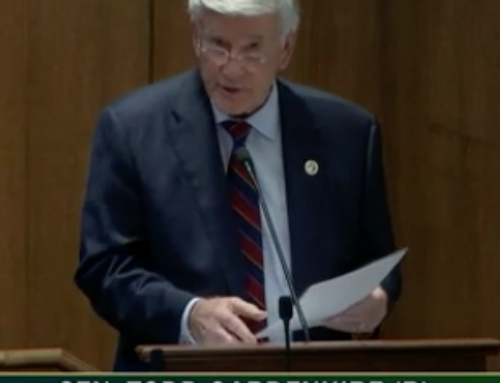With the General Assembly in full swing, several bills affecting government transparency are scheduled for hearings in subcommittees and committees next week.
Although some lawmakers may be planning to introduce amendments to these bills, as of this writing amendments for next week’s bills were not yet posted to the Amendment Packet page of the website that lists House amendments. (The Senate does not post amendments until after they’ve been adopted in committee.)
The legislation with probably the widest impact is a proposal to allow county commissioners to participate in meetings electronically, such as by calling in on a phone to a meeting that is otherwise being held in person.
That bill, HB327, sponsored by state Rep. Dave Wright, R-Knoxville, is sixth on the agenda for the House Cities and Counties Subcommittee, which starts its meeting at 9 a.m. Tuesday in Room III. (State Sen. Richard Briggs, R-Knoxville, is carrying the bill in the Senate, but the Senate bill has not yet been assigned to a calendar.)
County commissions seek exemption from Open Meetings Act
Wright’s bill would create an exception to Section 108 of the Open Meetings Act, which governs electronic participation in meetings. It would allow county commissioners to call into a meeting, but exempts the commission from following other rules that are otherwise required in Section 108.
Briggs has said his intention is to make sure that a commissioner who is sick with a medical emergency can attend the meeting and not “disenfranchise” that commissioner’s constituents. The bill also allows commissioners who are out of the county on business to call into a meeting, as well as commissioners who are called into military service.
However, there are as of yet no limits outlined in the bill as to how many commissioners might call in at any given meeting — other than a requirement that a quorum of the commission be present in person. Considering the size of some county commissions in the state, a physical quorum might still allow several commissioners to patch in by phone, creating confusion for the public on who is speaking and how they voted.
The bill also does not restrict commissioners from receiving per diem payments for attending a meeting electronically, address audibility, or include other safeguards that would allow the public to follow the meeting along easily.
The bill does limit a commissioner to attending electronically to only twice a year, but it’s not clear if that limit would include participation at committee meetings.
Read more about this bill and other bills seeking changes to the Open Meetings Act here.
Expanding tax credit secrecy
Another bill up for discussion next week is one that would allow the commissioners for the state’s revenue department and the economic and community development department to grant discretionary tax credits to entertainment, film and esports companies without revealing the name of the companies or the amount of the credit.
This is unlike other Tennessee tax credits in which any company meeting certain statutorily defined qualifications can qualify. In contrast, with this type of tax credit, the two commissioners may “in their sole discretion” determine that a tax credit for the company “is in the best interests of the state.”
However, because tax information is confidential, the Revenue and Economic and Community Development departments have said the identity of such companies receiving the discretionary credits and the tax credit amount are confidential. Essentially, only the two commissioners would know and the company itself.
That bill, SB736, carried by Sen. Jack Johnson, R-Franklin, appears to be an administration bill from the governor’s office and is scheduled to be heard early Tuesday morning in the Senate Finance, Ways and Means Revenue Subcommittee, which starts after the Senate Finance, Ways and Means Committee concludes.
The dangers of ‘proprietary creep’
Another bill that TCOG is watching is one that would create a “proprietary” exemption for the companies that administer group insurance for government workers in Tennessee. This largely involves the state’s self-funded health care plan for employees and public officials.
While the aim of the bill appears to be to make confidential provider reimbursement rates that BlueCross Blue Shield of Tennessee, Cigna and other administrators negotiate as part of managing the state’s group plans, it creates a broad “proprietary” exemption for any information received by the state from these entities.
TCOG has advocated that “proprietary” exemptions be reined in and replaced with exemptions that specifically enumerate the information to be confidential to avoid “proprietary creep.” Proprietary creep occurs when companies claim information to be proprietary that others might consider routine public information. For example, in Tennessee, companies have used proprietary and trade secret exemptions to keep confidential the value of contracts or lease agreements with the government.
The bill is being carried by state Rep. Pat Marsh, R-Shelbyville, who has said that if competitors were to see the reimbursement rates negotiated by the state’s health care administrators, they could undercut them in bidding or it could put the administrators at a disadvantage in negotiating the rates.
Marsh’s bill, HB134, is on the calendar of the House Public Service Subcommittee, which meets at 5 p.m. Wednesday.
Expanding confidentiality of applicants for state college presidents and chancellors
Last week, a subcommittee in the House passed a bill that would retain and expand confidentiality of applicants for the top positions at state colleges. This covers the president and chancellor positions in the University of Tennessee System, locally governed state colleges, community colleges and the colleges of applied sciences.
The bill came about because an exception to the public records law allowing a search committee to reveal the identity of only one applicant — the finalist selected — is set to expire this year. The bill, carried by Rep. Mark White, R-Memphis, and the chair of the House Education Committee, would renew the exemption and expand it to chancellors. (The previous version applied only to presidents.)
That bill, HB473, is on the calendar of the House Education Committee, which meets at 3:30 Wednesday. (See the video for TCOG’s testimony on the bill last week.)
Law enforcement records involving juveniles
Finally, a bill that appears to duplicate another exemption in the law regarding the confidentiality of juveniles in law enforcement records is scheduled for the House Public Service Subcommittee calendar.
This bill, HB368, would create a public records exception for “a record of a minor student…created by a school resource or other law enforcement officer, or that is maintained by a law enforcement agency as the result of an incident involving the minor that occurred on school property.”
However, state law already makes law enforcement records related to a juvenile incident confidential. (T.C.A. § 37-1-154) Records of juvenile court rulings in certain types of juvenile cases are an exception to the normal juvenile confidentiality, but only in cases when the juvenile is older than 14 and the crime, if committed by an adult, would constitute certain violent crimes, including murder, sexual assault, kidnapping and terrorism.


